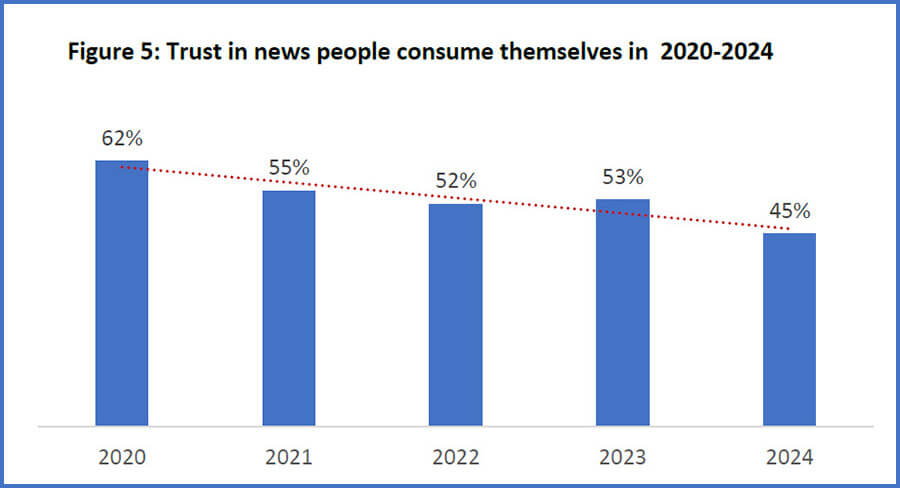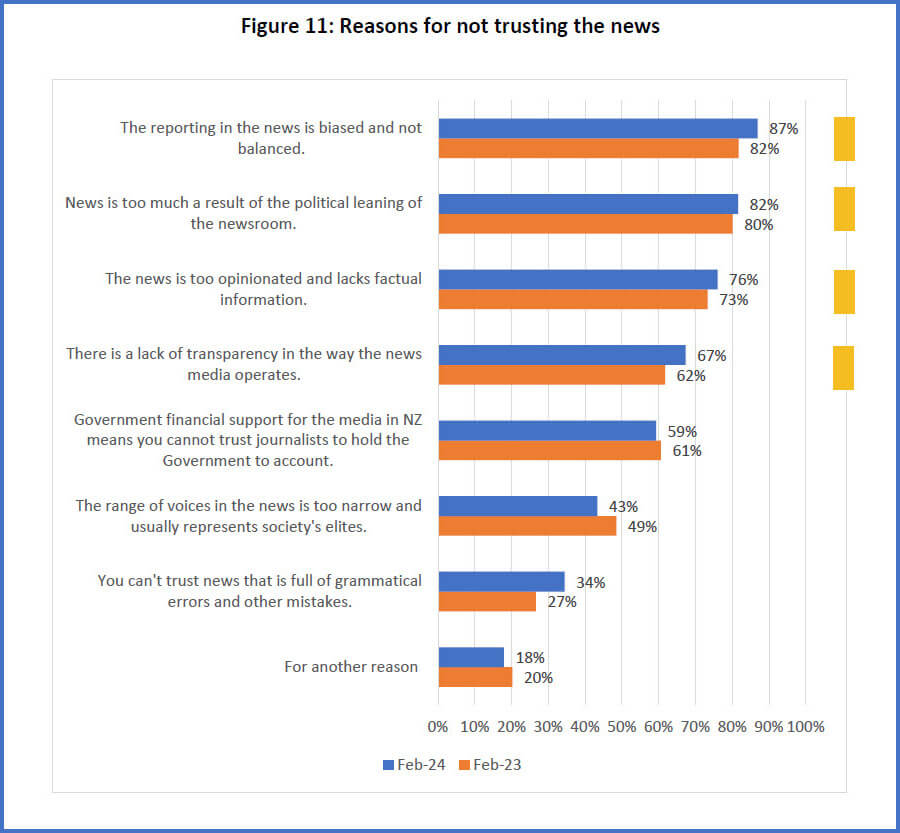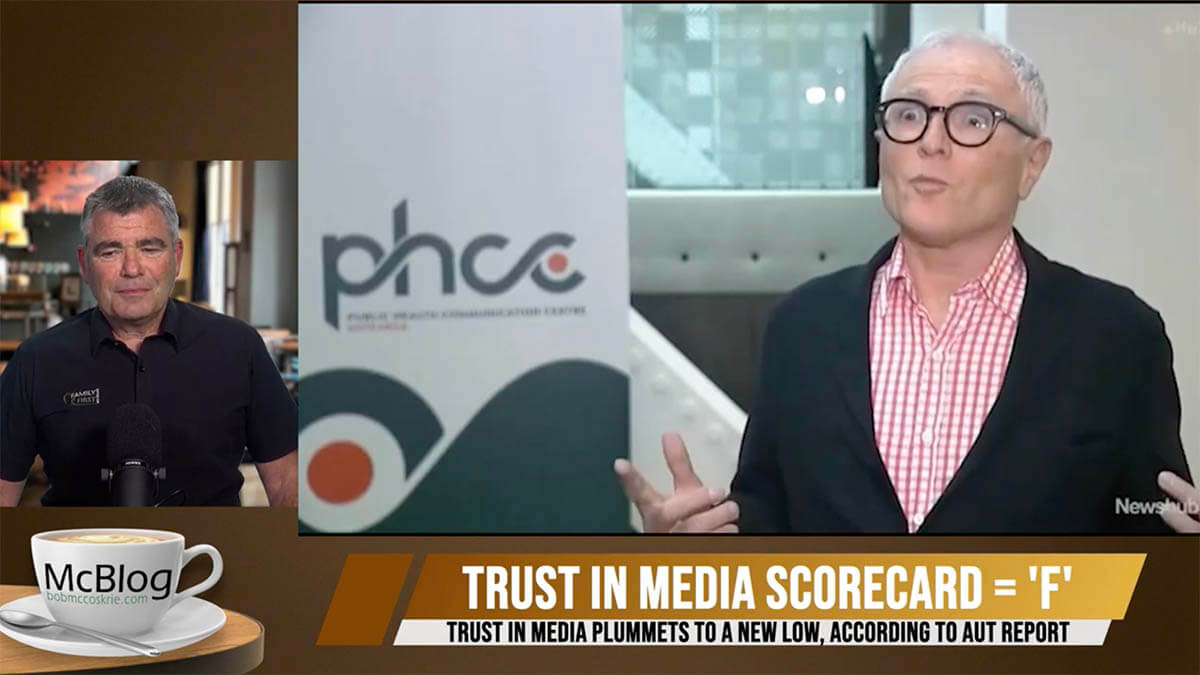Trust in Media Scorecard = ‘F’
Media Trust Scorecard is ‘F’ For Fake News or Fail or (no) Future …
A new report measures how much Kiwis trust the news media, and it has plummeted to a new low. It should actually be a wake-up call to the media if they want to avoid going bust, but it appears their desire to push their own agenda & opinion outweighs their desire to survive. Individually there are some fantastic, committed journalists with integrity. But as an industry it’s on its knees.


TRANSCRIPT:
Media Scorecard ‘F’ For Fake News
There’s a new report that’s just been released which measures how much NZers trust the news media.
Um…. As I said last year when that report came out, If this was a report card I was taking home from primary school for my parents to see as a 8 or 9 year old, I’d probably eat it on the way home so they wouldn’t see it! They’d be saying to me – haven’t you learnt anything? Why do you keep doing this!!
The new report confirms what probably many of you are feeling about the news media – but wonder if you’re the only one who’s frustrated. You’re not. But the extent to which the trust in media has plummeted has even shocked me
Let’s check it out.
This is the fifth report about trust in news in Aotearoa New Zealand produced by the AUT research centre for Journalism, Media and Democracy (JMAD). in collaboration with the Reuters Institute for the Study of Journalism.
It is based on a survey of 11 questions, most of which mirror those asked by the Reuters Institute for the Study of Journalism Reuters in its annual international survey. In 2023, the Reuters Institute conducted a survey of 46 countries across Europe, the Americas, Asia/Pacific and Africa, and our international comparisons about news interest, news avoidance, consumption, trust and news payments are made against this group. In 2024, 15 New Zealand news brands were included in this NZ study. The survey was carried out in February 2024.
So it’s important to note that being the 5th report at a regular basis with the same questions, strong comparisons can be drawn.
In 2020, 53% of New Zealanders trusted news in general. In 2024, that figure was at 33%. In five years, general trust in the news has fallen 20 percentage points. Just 1 in 3 NZ’ers trust the news media. Down from more than half five years ago. And you’ll notice that it was dropping by about 3-5 points each year but in the last year, it’s been a massive drop of 9 points! 2 in 3 NZers don’t trust the media. You’re not alone.
The Acumen Edelman Trust barometer in 2023 which looks at trust over various institutions showed that 58% of New Zealanders trusted businesses, 51% the government and 41% the media. In the orange circles. Apparently we trust politicians more than the media! That’s NZ in the blue, the global trust in black. For media on the right, we are below the global average of trust for media.
Even for news they consume and go to first, for the first time, less than half us trust even our preferred news sites. Or maybe because there’s not many left standing now, we’re not getting much option – because remember that this is based on news sites in NZ primarily.
Perhaps we’re all going elsewhere like McBlog and PulsePoint and StraightTalk. Well, just sayin’. It’s a possibility 😊
Compared internationally, the report says trust in news in New Zealand has fallen continuously, whereas in comparable markets it has somewhat fluctuated
Internationally, we’re competing with the UK and the US for the lowest levels of trust. If you want to trust the media, live in Finland. Or Kenya!
The survey found that based on the “proportion of news consumers who say they avoid news, often or sometimes”, guess who’s at the top. Yep – New Zealand. By miles – double the average
But here’s the interesting thing. NZ’ers are very interested in good news. See in the graph.
Here’s the age breakdown of interest. Once you reach the age of 55, apparently you’re supposed to be more interested in news.
So kiwis are interested in reliable news sources. The problem is we can’t find it amongst our current legacy media. And the NZ media seem to be refusing to listen to the feedback.
Because in terms of trust, the report says all the major news brands saw substantial declines in trust in 2023 especially TVNZ and Newshub – the 6pm and Breakfast news channels!
So if you are watching or listening or reading, which ones?
In order of popularity, TVNZ, Stuff, Newshub, NZ Herald, Social media, then Radio NZ, and commercial radio would include Newstalk ZB..
Look out the right for the drop – all negative – so drop in audience.
All have declined except Newstalk ZB. But big drops for the top 3. Over the last 2 years, Stuff has plummeted 13 points
In terms of trust in the individual news media, down the left hand side is who we trust most down to the least. What I noticed is how low Newshub, NZHerald, Newstalk ZB and Stuff are down the list. Although it was good to see The Spinoff even lower. That’s well deserved.
But if you look out the right, all show a drop in trust, but that % is only based on the last 12 months.
If you look at the drop since 2020, Radio NZ, TVNZ, has actually dropped 30%. In fact the main ones 25% – 30%.
But here’s the key graph in my view. Reasons NOT to the trust the news in 2023.
And here’s the top 4 and they’ve all increased since last year
- The reporting in the news is biased and not balanced
- News is too much a result of the political leaning of the newsroom
- The news is too opinionated and lacks factual information
- There is a lack of transparency in the way the news media operates
And note the 5th one – 61% say Govt financial support for the media in NZ means you cannot trust journalists to hold the government to account.
Approximately 84% of respondents were concerned about fake news. Approximately 92% of respondents were concerned about poor journalism, down from 94% in 2023. “Poor journalism” was defined as making factual mistakes; dumbed-down stories and misleading headlines/clickbait. 92% !!
96% of respondents – almost all of us – were concerned about “stories where facts are spun or twisted to push a particular agenda”,
Wow! Damning.
So how did the media elite respond to this?
Well the report quotes Newsroom co-editor Mark Jennings who said “In my 22 years as head of TV3 news and seven years as co-editor of Newsroom, I’ve seen the public trust in the media decline to a point where it is impacting our democracy.”
Actually, I’d say it this way. I’ve seen the media decline to a point where it is impacting our democracy.”
It’s not the public trust affecting democracy. It’s the quality of media.
The NZ herald editorial said
With big world events like the US election just months away, we’re likely to see a flood of disinformation hitting social media and further eroding people’s trust in news media. Artificial intelligence (AI) tools, which, sure, can be used for good things, could also become a powerful weapon in spreading disinformation. All of this is coming at us fast and it is urgent that everyone has the media literacy skills required to tell the difference between real and fake news.
Oh we know the difference between real and fake news. Read the room, editors. Read the room.
And stop blaming social media. It’s been around for decades. Facebook started in 2004. 20 years ago. Twitter started in 2006. Radio NZ and NZ Herald went onto Facebook way back in 2008. Your disinformation and misinformation tags are just a smokescreen.
In fairness, Newshub did a pretty good report – here’s a few excerpts
I’m not sure interviewing Michael Baker was a good idea. It reinforced some of the concerns around his period of fame when we were told via the media that the government was the podium of truth – without challenge by the media. Other low points were the Jessica Tova issue – remember that video from McBlog – and also when the newspapers worked together to ban our What is a Woman advert. It showed the pushing or at least the blocking of a certain narrative that they disagreed with. And then the whipping up of the media storm around Posie Parker really rarked people up.
And they complain about Winston Peters – but it’s also Labour MPs who were in government at the time of this declining trust who were expressing concern. This is from December 2022 with Willie Jackson the then Minister of Broadcasting.
1News didn’t have coverage on their news last night. Interesting.
But in their online report, they did quote one of the AUT researchers who made this very telling comment:
“Journalism has lost its authority as the main source of news and information. In general, people distrust the information they see, and they are increasingly checking their ‘facts’ themselves. This phenomenon is highly problematic.” – Research centre co-director Merja Myllylahti
Much of this decline is happening because many kiwis can see for themselves the extreme bias coming from an increasingly woke media, and their selective use of information to support certain “progressive” agendas. Many people also believe the media has mostly become a marketing & PR department for the Government and are compromised by the government funding – you can see that in this survey.
And the numbers show that it’s not just right wing people turning off because its left wing, or left wing turning off because it’s right wing. It’s both. It’s not anti-mandate people or people who didn’t want the vaccine or climate change deniers or TERFs or white people.
This survey is showing that kiwis from all sides have had enough. 2 in 3 kiwis are saying – do better.
Instead of reporting the news and presenting facts, the media has increasingly become activists pushing opinions instead of facts, trying to control the narrative. We’ve proved that through our analyses of how they covered the cannabis referendum, the ‘conversion therapy’ debate, the overturning of Roe V Wade, and the mandate protest on parliament grounds.
We deserve better. This report should actually be a wake-up call to the media if they want to avoid going bust, but, sadly, I suspect it won’t be.
Their desire to push an agenda outweighs their desire to survive. Individually there are some fantastic, committed journalists with integrity. But as an industry it’s on its knees.
Will it get back up again. I just don’t know. And as someone who was involved in the media, it is very sad that we’ve got to this point.






